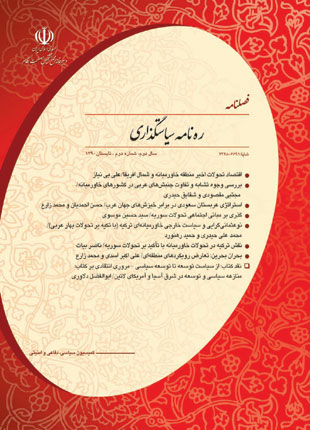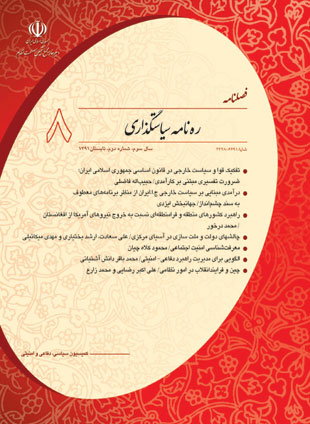فهرست مطالب

ره نامه سیاستگذاری سیاسی، دفاعی و امنیتی
سال دوم شماره 2 (پیاپی 4، تابستان 1390)
- تاریخ انتشار: 1390/04/04
- تعداد عناوین: 8
-
Page 11Since late 2010 some of the Middle Eastern and North African (MENA) countries have been witnessing protest and social unrest, of which some have triggered regime changes in the region and some are still alive and active. These social protests are highly attributed to the existence of high youth unemployment, soaring inflation, and lack of transparency, social injustice and widespread public corruption. Accounting for geopolitical considerations, some analysts, on the other hand, tend to believe that a new wave of Islamic social awareness is in built. However, of an interest to this paper is an investigation into the economic dimension of the recent developments in the MENA region. Departing from narrow neoclassical doctrine of economic development, which focuses entirely on the economic policies and their relevant implementation institutions, this paper discusses the economics of MENA uprisings with a holistic approach, i.e. in the context of a galaxy of recent international developments which may have fashioned the recent MENA developments. Dividing the region's economies into "accommodative oil exporters", ''non-accommodative oil exporters'' and ''oil imports'', the paper comes to the conclusion that there may be a chance of the Iranian economy to be pushed into the state of a ''virtual oil exporter'' while suffering from the intense economic sanctions as a consequence of recent developments in the MENA region. This means that the country may get in a gradual manner more of the characteristics of an oil importer in the region. Keywords: Recent MENA developments, accommodative and non-accommodative oil exporters, World Financial Crisis, new emerging economies, the Greater Middle East Plan, the Iranian economy, virtual oil exporter.
-
Page 41The social trends which have begun since late 2010 in the Middle East and North Africa, of which some have led to revolutions in places such as Tunisia, Egypt and Libya, and some are still taking shape in countries like Yemen and Bahrain, have been attracting attention of many experts and analysts from within as well as without the region. These domino-like developments, which have been titled as "Arab Spring" could have Long-term consequences and implications for the Middle Eastern and North African countries, including Iran. Although the impact of some of these changes may not be felt in the short term, for sure, they have widespread impacts in the long term for the whole region. Using a descriptive - analytic methodology, this paper tries to examine the differences and similarities of the current movements in the Middle East. In particular, the policy response of the respective governments vis-à-vis these movements, and the role of regional and trans-regional powers along with the future of these movements will be of special interest to this paper. Demanding democracy, economic problems, lack of social justice, bad governance, political repression, class divisions and the role of youth, women, and new media are among the factors that have contributed to the emergence of the so-called Arab Spring. It should be noted that the extent of impact of each of these factors, as well as the response to the movements and forms of resistance and protest, have not been identical in the countries under investigation.Keywords: Arabic Movements, Middle East, Globalization, the New Media, Demanding Democracy
-
Page 75This paper has in mind to investigate the strategic move of the Saudi Arabia's Government vis-à-vis recent popular uprisings in the Arab world. Putting Saudi Arabia's national priorities and goals at perspective, the author tries to understand the core elements of Saudis Government's strategic move in the past few months as far as Kingdom's adjacent and neighboring countries in the Arabian Peninsula are concerned. Like many other Arab states in the region, Saudi Arabia was faced with internal unrests in the early 2011. However, due to the limited scope of these social unrests out there, and utilization of suppression methods and financial incentives by the Government, Riyadh was able to stabilize the internal situation to some extent and in exchange pays attention to the waves of change in the Arab periphery world. In particular, Riyadhs’ strategic move after March 2011 might be seen in this context. Having this in mind as a main job of the paper, internal developments in the Kingdom will be touched upon only to the extent that they may have something to do with the developments in the periphery world. The time-span of the paper's investigation is the year 2011.Keywords: Saudi Arabia, Uprising, Arab Spring, Middle East, Bahrain, Yemen
-
Page 99The first months of 2011 were witnessing the arrival of the new wave of Middle East movements to Syria, a phenomenon which disturbed the relatively calm Syrian society. So far, therehas not been any consensus among political analysts with regards to the root causes of the Syrian crisis, unlike Tunisian and Egyptian cases. While some analysts call this phenomenon asocial riot, others call it revolution or even a soft regime change. However, the Syrian case like many other Middle Eastern cases where the showcase of social creativities were present with the help of internal as well as external factors in the post cold war era, and of which some have been exploited by the Western actors, is worth to be investigated in terms of the specifics of its internal as well as external contributors. This paper tries to review first of all the social and structural elements which have paved the way to the emergence of the new wave of people's protest in Syria. Then, it will touch upon the measures taken by the Syrian Government in order to overcome the crisis and pacify the social environment. Finally, the paper discusses about the policy response consequences and the fact that how it may contribute to the obstacles and difficulties that the Syrian Government faces with.Keywords: Reforms, Bashar Asad, the Islamic awareness, Syrian developments, crisis management
-
Page 135In order to understand the social and political developments of Turkey, one should look at the continuous course of domestic events which has been taken place in the aftermath of the establishment of the Republic of Turkey in 1923. Thereafter, Government's behavior was anchored around a secular ideology in domestic affairs and desire for alignment with the West in foreign policy. Turkey was the first Muslim country who recognized the state of Israel and join NATO in 1952. During the past years the Turkish Government has strongly pursued nomination for membership in the European Union. However, with the rise of the right-wing governments in the EU, Turkey's chance reduced and it faced with numerous challenges in this regard. With AKP's move into office in 2002, a multilateral foreign policy based on "the strategic depth concept and the strategy of zero problems with neighbors" was initiated by the Erdogan government in order to maximize the national interest of the country in the region. In the aftermath of this change, came in the Spring Arab in the region, which put the multilateral foreign policy of Turkey at jeopardy and under severe scrutiny and test. This is so because from one hand, Turkey has extensive bilateral relations with the authoritarian regimes of the region, on the otherhand gaining the favorable public image to support civil society reforms in the region; it should play nice with these institutions at the same time.Keywords: Neo – Ottomanism_Europe_Arab Spring_Strategic Depth_the AKP
-
Page 161In the contemporary world, recent development in the Middle East seems to be one of the most important ones in terms of depth and scope that the region has experienced at large. People's protest has happened as a result of hunger for democracy, standing against despotic ruler, rejecting oppression and struggling for the rule of law and good governance. Protests for the first time started in Tunisia, and then spread to Egypt, Libya, Yemen, Bahrain and Syria. The situation in Tunisia and Egypt was so severe that the collapse of Ben Ali and Hosni Mubarak dictatorships happened as a result. Libya experienced so extensive hostility between Moa mar Gaddaffi regime from one side and revolutionaries from the other side that with NATO's interference Moa mar Gaddaffi regime fell down. Yemen and Bahrain are witnessing endless hostility between Ali Abdullah Selah and Al Khalifa from one side and people from the other side. While this harsh situation has attracted the attention of many countries throughout the world and in the region, Saudi Arabia's interference calls for repeated suppression. In Syria, although the situation might be relatively different than other countries in comparison, however there are evidences of paradoxical interferences from outside world, in particular from Turkey. This paper tries to explain Turkey's foreign policy vis-à-vis recent developments in Syria and contends that exploiting current situation in Syria; Turkey has in mind to struggle for overtaking the regional power and influence of Iran through continued campaigning for human rights, democracy and reforms.Keywords: Middle East recent developments, popular protests, Turkey, Syria's recent developments, Justice, Development Party
-
Page 179IThe regional significance of the Bahrain crisis is due not only to the limitation in the power of the internal actors but also to the special interest of external actors. Regional actors in terms of their differences in terms of national objectives and interests and because of their special considerations have approached the Bahrain crisis with diverse and even opposing approaches. The Gulf Cooperation Council which has Saudi Arabia in its core of decision making along with the Islamic Republic of Iran are the two main regional players whose policy position vis-à-vis Bahrain crisis is in sheer contrast. Other regional actors such as Turkey and Iraq because of insignificance of their geopolitical consideration vis-à-vis Bahrain, try to adopt a more balanced approach.Keywords: Bahrain, the Gulf Cooperation Council, Iraq, Iran, Turkey


